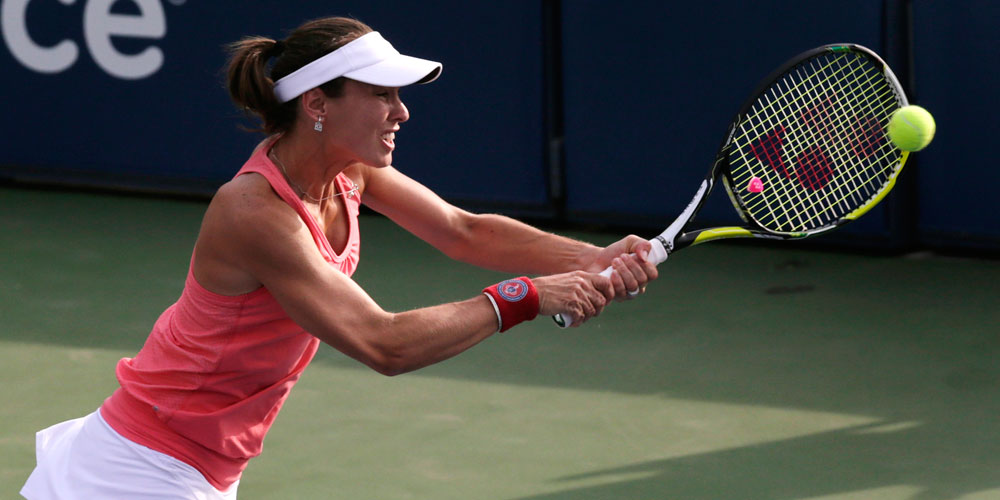
Martina Hingis, of Switzerland, returns during her women’s doubles match with partner Daniela Hanuchova, of Slovakia, while facing Sara Errani and Roberta Vinci, both of Italy, at the 2013 U.S. Open tennis tournament, Friday, Aug. 30, 2013, in New York. AP
NEW YORK — At times, Martina Hingis looked like the champion of old — such as when she was pounding forehands or placing crisp volleys right where she wanted them.
At times, Hingis looked like an old champion — most notably, when she double-faulted twice to close out her loss in women’s doubles at the U.S. Open on Friday.
Returning to Grand Slam tennis for the first time since 2007, the 32-year-old Hingis went 0-2.
First, she and Daniela Hantuchova lost to the top-seeded and defending champions Sara Errani and Roberta Vinci 6-3, 7-5. Later, Hingis and Mahesh Bhupathi fell 7-6 (5), 7-6 (5) to Chan Yung-jan and Robert Lindstedt in a mixed-doubles match marked by a number of disputed calls in the second-set tiebreaker.
“I always enjoyed the big stage. Even today,” said Hingis, who was inducted into the International Tennis Hall of Fame last month. “You see the people that came. They enjoyed it. They really cheered us on. So, I mean, I couldn’t ask for more.”
Well, except for one thing.
“I mean, I always play tennis to win matches and to win tournaments,” she said.
In the first match, while trailing 6-5 in the second set, Hingis served three double-faults, including on the final two points. One of the serves barely reached the net and another was nearly a foot long. Moments after that, she sat down and buried her face in her towel.
“Definitely the nerves. Not playing at a Grand Slam for six years doesn’t really help,” she said.
Hingis won five major singles titles and nine more in women’s doubles from 1996-2002 before her first retirement. She came back in 2006, then left again under awkward circumstances a year later when she tested positive for cocaine at Wimbledon and was handed a two-year ban. Instead of fighting the charges, she retired again.
Only a month ago, as Hingis was preparing for her Hall of Fame induction, she was also planning a comeback. She played three events with Hantuchova in a couple of U.S. Open tune-ups.
Her official return to Grand Slam action was greeted by a bad draw — the top-seeded team of Errani and Vinci.
“She still plays unbelievable,” Vinci said. “She’s a great player. She felt a little bit of pressure at the end, of course.”
Hingis’ play harkens to a day when female tennis players could get by on guile and touch instead of big serves and power groundstrokes.
She was, indeed, quick with her hands Friday. She got into a couple of extended cross-court rallies with Errani, and won a few.
“I didn’t have any problem with the speed of the game or anything,” Hingis said. “Errani is No. 5 in the world, and I was like still rallying with her, and at the net, I think I’m pretty good. The only thing that hurt me in the past was the serve. Today, it’s even more a key factor, especially in doubles.”
Lindstedt was impressed by Hingis. He figures she could be a top-10 doubles player. He said her return of serve was as good as he’s seen from a woman in mixed doubles.
“A genius on the court,” Lindstedt called her. “I’ve never seen a girl who can control pace on a serve the way she does. … If she guesses right and she’s there, she’s not fazed by the power. I’d heard that before, but being a cocky male and all, I figured, ‘It’s all right.’ But she got me a few times.”
The end of the mixed doubles match was strange, with Bhupathi disputing a call for about a minute, then Lindstedt following with a pair of double-faults, the second of which came on a foot fault that compelled him to lightly toss his racket over the net.
Hingis thought she showed she can hang with the world’s best players on the biggest stages, “but it would help to win some matches for confidence, I guess, especially those big points.”
Asked if her comeback could include a return to the singles court, where she first reached No. 1 in 1997, she responded: “God, give me a break.”
“No, I haven’t given any more thought to it,” she said. “I have a hard time covering half the court and trying to be there. Full court is completely different ballgame.”

